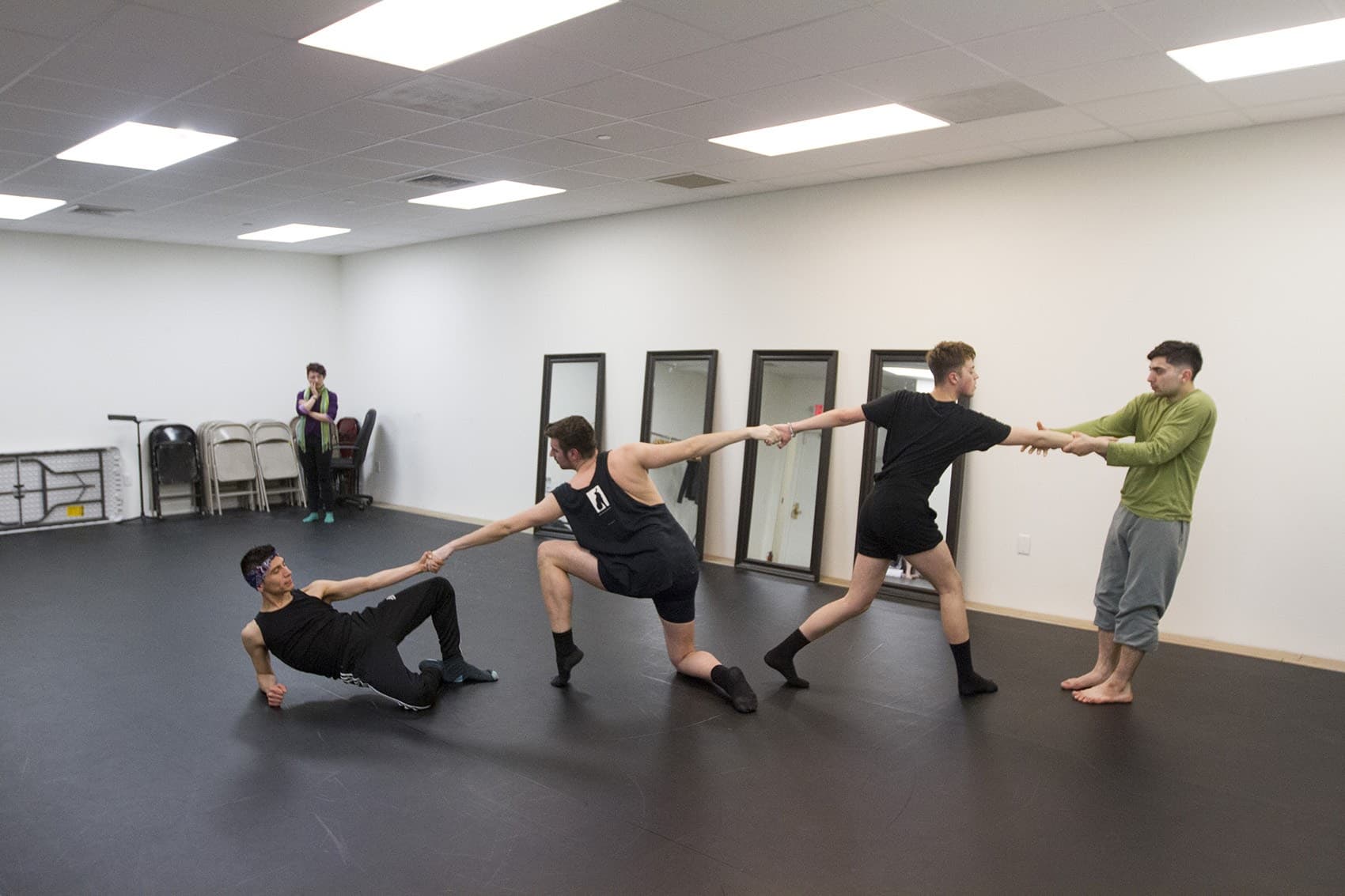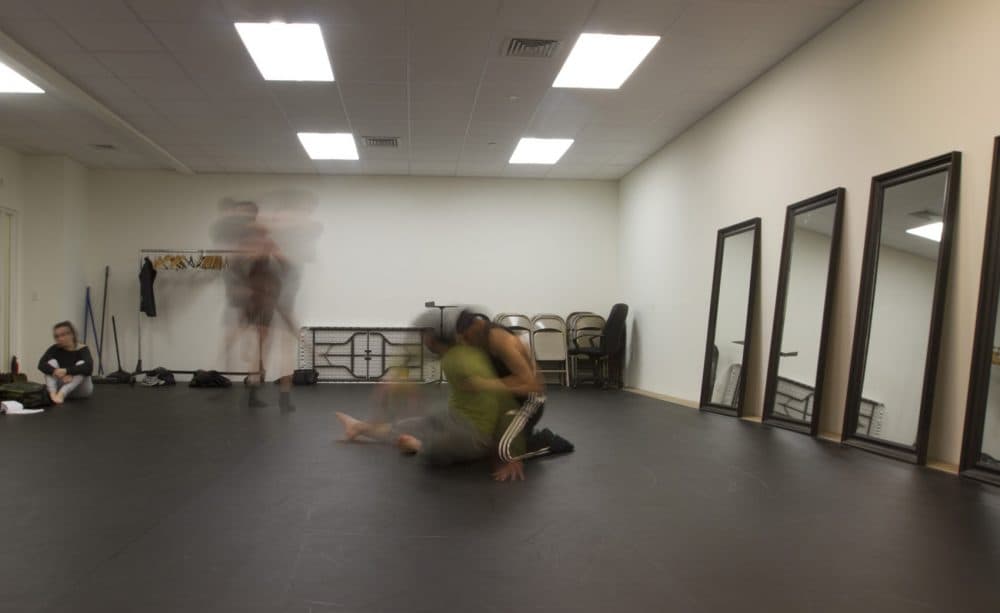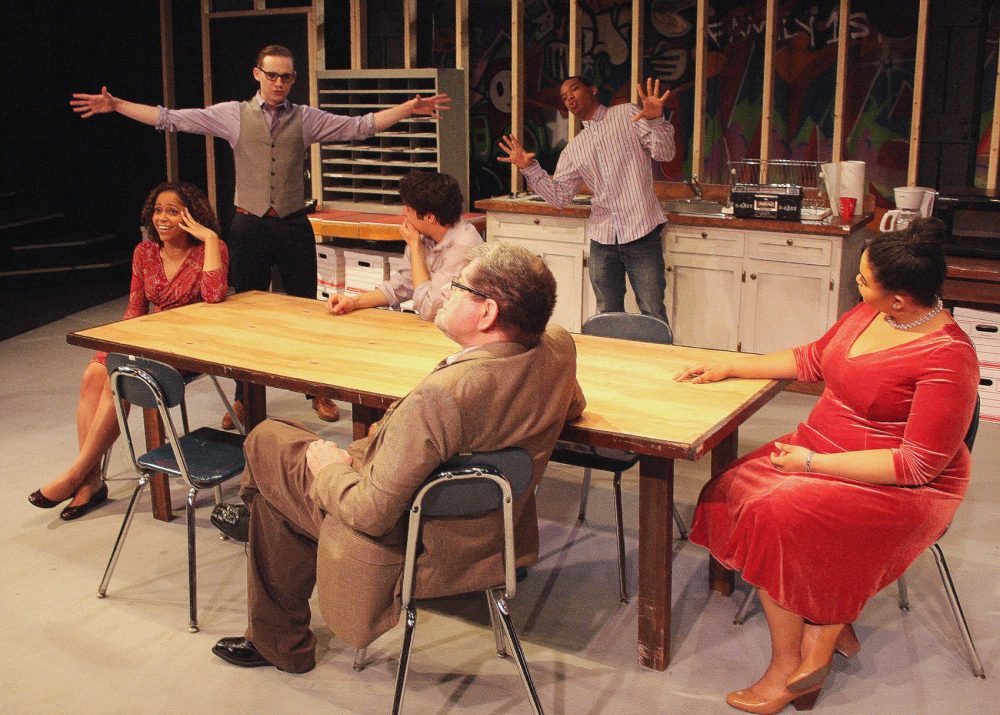Advertisement
How Small Theater Organizations Are Feeling Greater Boston's Space Crunch

One of the complaints that surfaced during the year of public meetings and research that went into the master plan for arts in the city known as Boston Creates was that smaller arts organizations in the city have trouble finding affordable space for rehearsal and performance. It spurred a city-led study of the issue, which is still ongoing.
This is a behind-the-scenes problem that may not be evident to the typical arts patron. So just how bad is it?
For years, a popular solution for performing groups looking to rehearse on the cheap has been to use classrooms at MIT after hours. Though the school has kicked unauthorized groups out in the past, the MIT plan has endured as a wink-and-a-nod fix, such that availability for that space can be highly competitive between sanctioned student organizations and fringe theater groups looking for a clean, well-lit place to rehearse.
“In the past you’ve been able to say ‘We’re going to meet there and we’ll text you when we find a room.’ But within the last year or two I’d say, most of those rooms are completely taken already,” said Louise Hamill, artistic director of of Fresh Ink Theatre Company. “I’ve even seen dance companies in the hallways. There are so many theater companies and improv companies, so many different art types who need rehearsal space, that battling each other [for space] is impossible.”

David Miller, artistic director of Zeitgeist Stage Company, has also seen a dance company rehearse in the hallways at MIT when scouting for a free room.
“It’s funny, but it’s not,” he said. “It’s also kind of sad that there aren’t cost-effective alternatives that you can reserve and be sure you’re going to have space. It’s the plight of the small artist.”
He stopped relying on found space at MIT several years ago, but once in a while finds himself stuck for a rehearsal space and tries it again — in which case, he says, it’s not unusual to spend a chunk of the designated rehearsal time simply looking for an available room.
The shortage of work space means that available venues can be very pricey for theater and dance groups producing work on a shoestring budget. Miller rented rehearsal space at a South End church a few years ago for $15 an hour. He inquired again the following season, and was told the rate has increased to $150 an hour.
Advertisement
“So that church went off the list,” he said.
The closing of the Factory Theatre and its adjacent rehearsal studio in 2014 was a big blow to smaller theater troupes looking for space. Options remain at venues like the Rockwell (formerly Davis Square Theater) in Somerville and Charlestown Working Theater, but it’s still competitive to find space, and rental fees can strain small budgets. Pete Riesenberg, artistic director of Office Of War Information (Bureau of Theatre), said a fee of $25 an hour is typical, and even that adds up for a company with a shoestring budget looking to book space for at least a week of rehearsals followed by two or three weekends of performance. He too has been kicked out of MIT after hours.
So performing groups look for creative solutions to their space woes. Fresh Ink has taken to reserving a work room in the newly renovated wing of the Boston Public Library, but the library’s 9 p.m. closing time restricts it to a three-hour after-work rehearsal on weekdays. (Four hours would typically be a minimum rehearsal length.) These rehearsals are also on view to any library patrons who happen to be passing by, and of course the actors need to limit their volume.
Fringe companies are not the only ones looking for creative solutions. Last season, Lyric Stage Company of Boston, the city’s longest tenured nonprofit theater, rehearsed “Mr. Burns, A Post-Electric Play” in a Cambridge bookstore.
There has been some good news lately on the venue front. Lyric Stage opened its first in-house rehearsal studio in December, complete with a sprung floor suitable for dance, and is now using it as well as renting space to Boston Dance Alliance. (The Lyric has budgeted $10,000 to $20,000 a year to rent offsite rehearsal space in years past, managing director Matt Chapuran said.)

Apollinaire Theatre Company in Chelsea recently dedicated a new facility in a space that most recently was a furniture store. Its new Riseman Family Theatre includes space for performance or rehearsal, set-building and storage, administrative tasks and an event space including a stylish bar.
“We sort of went from looking at strictly a performance space to looking at what are all the different aspects of what a theater company needs, from beginning to end, to put on a show,” said Danielle Fauteux Jacques, Apollinaire’s artistic director. “They could be hanging out here, working on a laptop, having meetings, rehearsing upstairs, building downstairs.”
These new spaces built by Apollinaire and the Lyric required some amount of collaboration between larger and smaller organizations to be economically viable. The Lyric counted on the rent it will receive from Boston Dance Alliance, which was partially offset by a grant from The Boston Foundation. Apollinaire received $250,000 from a MassDevelopment program supporting collaborative work spaces in so-called gateway communities.
Boston Center for the Arts, one of the city’s more visible hubs of theater performance, also expanded its residency program this season. The BCA has long counted SpeakEasy Stage Company, Company One and Theater Offensive as resident theater groups; that designation was extended to another 11 theater and dance organizations, including Zeitgeist, Fresh Ink, Office Of War Information (Bureau of Theatre) and Public Displays of Motion. Residency status gives these groups first dibs at booking available dates and a discounted rental rate.

For fringe theater groups, the affiliation itself can be a valuable profile-raiser.
“It’s about being able to say: Hey, we’re a resident company at the Boston Center for the Arts,” said Pete Riesenberg, artistic director of Office Of War Information. “It’s always nice to put in a press release or when you’re sending your message to your audience, that sort of thing. I think there is an intangible value to saying that there’s enough merit in Office of War Information for them to select us.”
Gregory Ruffer, president of the BCA, said his organization can provide additional support to groups with less experience.
“We can help them guide them. We talk with them all the time about insurance, liability, how to read a contract and what that means. So I see these residencies as being an opportunity to really strengthen these organizations.”
The city of Boston is seeking to facilitate additional collaborations. The Boston Creates plan includes a program to make non-conventional venues available to small arts groups for rehearsal free of charge, with commitments from Massachusetts Eye and Ear Infirmary, Plumbers and Gasfitters Local 12 union in Dorchester and the AT&T flagship store in Copley Square.
The program got off the ground in November with a call for artists to apply for the AT&T space; Mayor Marty Walsh’s office said it expected to announce the participating group soon.
“We’ve used schools, churches, apartments when we absolutely had to. A lot of our space is still determined by who’s involved in the production and what connections they have,” Hamill said. “I think we didn’t realize how good we had it at the Factory until the Factory wasn’t there anymore. And there’s been nothing to step into the place of that building. It just doesn’t exist anymore.”
With creative solutions needed in the face of a lack of affordable work space, the current market leaves many performing-arts groups to figure out rehearsal and performance solutions one show at a time.
Correction: An earlier version of this post incorrectly identified the Boston Dance Alliance as the Boston Dance Company. We regret the error.
This article was originally published on February 28, 2017.
